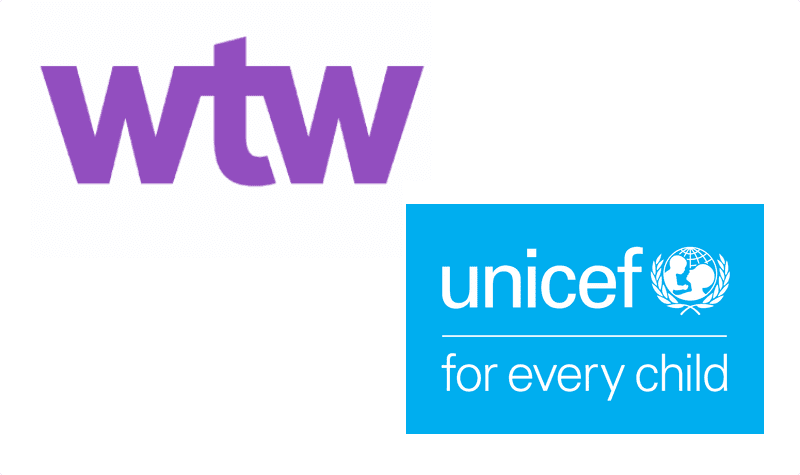WTW designs parametric risk transfer for Global Shield funded UNICEF initiative

WTW has designed a parametric trigger for a responsive tropical cyclone insurance arrangement that will support a United Nations Children’s Fund (UNICEF) initiative to provide sustainable disaster and climate change protection to meet the needs of vulnerable children.
The UNICEF Today and Tomorrow Initiative will invest in climate resilience and anticipatory action to improve cyclone preparedness in select climate-vulnerable countries.
It’s set to be complemented by a rapid response to tropical cyclones, which will be financed through a pre-arranged parametric insurance policy that has been designed by WTW.
The parametric risk transfer arrangement has been launched with support from the German and UK governments under the newly launched G7-V20 facility we wrote about yesterday, the Global Shield against Climate Risks.
This programme of work and risk financing is expected to provide at least $100 million of protection over an initial three-year period.
It covers four global regions and will focus on eight UNICEF host countries, Bangladesh, Comoros, Haiti, Fiji, Madagascar, Mozambique, Solomon Islands, and Vanuatu.
All of these are either classified as Least Developed Countries (LDCs) or rank amongst the global top 15 countries at risk from climate-related disasters, or both.
Karin Hulshof, UNICEF Deputy Executive Director for Partnerships, commented, “The risks of climate change are no longer hypothetical. They are here. And even while we work to build communities’ resilience against climate disasters, we have to become much better in pre- empting risks for our children. We know more climate disasters are in the making. We just do not know where or when they will hit.”
This will be the first time that an ex-ante climate disaster risk financing mechanism has been designed to specifically targets children, despite the fact children represent the majority affected by disasters around the world.
Simon Young, a Senior Director in the Climate and Resilience Hub at WTW, explained, “UNICEF is the first UN institution, as well as one of the largest humanitarian organisations worldwide, to take out a bespoke disaster risk coverage for the protection of children, young people and parents, especially mothers. As such, UNICEF is pioneering proof of concept for other organisations in the field. The decisive action by UNICEF can be a catalyst for more efficient, reliable, and quicker humanitarian crisis finance.
“WTW supports UNICEF’s Call to Invest, and to mobilise additional financing for preparedness under the Initiative’s Today component. We stand ready to continue our role in helping to climate- and future-proof humanitarian finance through pre-arranged and trigger-based funds to mitigate the impacts of climate shocks.”
The parametric risk transfer arrangement builds on a specially developed Child Cyclone Index, which has been created to capture children’s exposure to tropical cyclone and their related relief needs.
The parametric risk transfer product has been enhanced through the inclusion of a minimum payment for smaller events, of at least between USD 50,000 and 150,000 (varying by country), that can be activated by any event with a windspeed of at least 39 miles per hour over land / 63 kilometers per hour, where that event is also linked to impacts on children and young people.
Estimates suggest that the initiative will benefit 15 million climate vulnerable children, young people, and a large share of women as well, enhancing the resilience of households and communities to climate shocks.
The goal is to enable rapid financing of UNICEF’s response for children, young people and women that are subject to cyclone-related impacts, based on payouts linked to the WTW-designed parametric insurance product.
Heike Henn, a Director at the German Ministry for Economic Cooperation and Development (BMZ), stated, “We are pleased to support UNICEF in advancing the world’s first child-centred financial protection tool for climate-related hazards and show the new G7/V20 Global Shield Against Climate Risks at work. We expect that UNICEF’s Today and Tomorrow Initiative will deliver in three areas: first, increased uptake of ex ante risk financing solutions by governments through knowledge sharing and increased familiarity with risk financing instruments; second, improved institutional and operational shock resilience of development institutions, and third and most importantly, closing the disaster risk protection gap for the most vulnerable people, especially children and mothers.”
Rt. Hon. Andrew Mitchell, Minister of State in the UK’s Foreign, Commonwealth & Development Office, added, “The UK is proud to be a partner in the new Global Shield against climate and disaster risks, and to co-fund the Global Shield Finance Facility. We strongly support bringing pre-arranged and trigger-based financing to the humanitarian sector, and I’m delighted that the Facility will expand its work as part of the Shield, including this new grant to UNICEF to enable them to protect up to 15 million children, young people and their families across Africa, the Caribbean, Asia and the Pacific, and respond rapidly if tropical cyclones hit.”
It’s encouraging to see such positive comments regarding the use of responsive risk transfer, to support anticipatory and humanitarian financing solutions for climate and disaster related risks, as well as to see the Global Shield in action in funding such initiatives.






